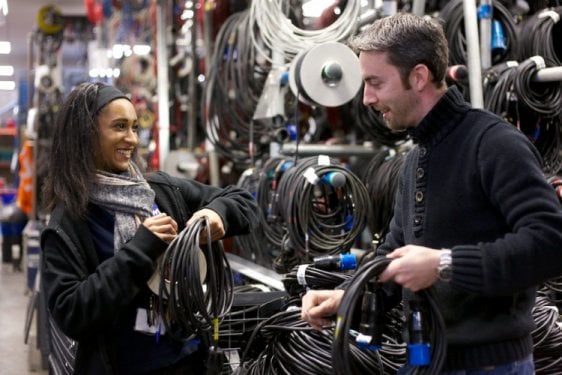
Photo: Creative & Cultural Skills/Briony Campbell
A technical route into the arts
Sara Whybrew explores the impact that the new T Level qualifications – an alternative to apprenticeships or A Levels – may have on the arts sector.
At Creative & Cultural Skills we believe that growth in our sector can’t really happen unless people are trained and skilled for the jobs that actually need doing. So we welcome the move to concentrate a technical learning system on gaining occupational knowledge and competence.
For years we’ve championed the importance of recognising technical education in equal measure to academia
We also welcome the Government’s ambition through this reform to rationalise the plethora of qualifications currently available, and the confusion that such a wide choice can lead to for learners, parents and employers. Simplifying the qualifications on offer has the potential to help everyone better understand the value, quality and impact of training so it can be trusted.
For years we’ve championed the importance of recognising technical education in equal measure to academia. We know the intention of these reforms is to do just this, so we look forward to this fundamental ambition becoming a reality.
The technical route
By 2022 young people aged between 16 and 19 will be given the option to either undertake A Levels, an apprenticeship or a T Level.
There are 15 new technical education routes, against which there are (or will be) panels made up of industry representatives, helping to decide how people will train for the occupations within each route. These range from ‘childcare and education’ to ‘legal, finance and accounting’, and include ‘creative and design’.
The plan is to have only one awarding organisation per route responsible for the qualifications that sit within it. This presents both an opportunity and a huge challenge for the many awarding bodies operating across England today, particularly for those that have created qualifications in very specialist and niche areas of learning and that might struggle to find a space in this new system.
T Levels are classroom-based, level 3 study programmes that will last two years (full time) and will be based on standards designed by employers to train individuals to be ready to work in an occupational field. The learner will be able to progress from the T Level on to either an apprenticeship or further technical training at a higher level where available.
There will also be the option for a learner to progress from the T Level into an academic programme of study, so the technical and academic routes are interchangeable in a learner’s journey.
T Levels will have three standard elements:
- A technical qualification to complete related to the occupational field of the T Level
- Employability training, enrichment and pastoral provision, similar to existing study programmes
- A mandatory 45 to 60 days of work experience to be completed in the second year of the T Level.
In addition to this, the learner may need to acquire certification in English, maths and digital skills to an agreed level set out for the T Level, along with any other training necessary for the occupational field.
T Levels are designed to help a candidate reach job-readiness, not occupational competence as an apprenticeship does.
Unanswered questions
These changes, already in motion, are quite significant. But for us there are a number of unanswered questions, which fail to recognise the diversity of thought, practice and skill that apply across our broad and varied workforce, along with a breadth in provision that we know is necessary if we’re to support the widest possible range of people in our workforce.
I think all of us welcome the idea that work experience becomes part of the learning process. But in a sector like the arts, which is dominated by small and micro businesses, how will organisations have the capacity to thoroughly support such a lengthy work experience placement on an ongoing basis?
Our geographical spread is also a challenge, with organisations clustered in London, the south east and larger cities. For example, how will the option to undertake a creative and design T Level be made available in rural areas where there is limited choice or no choice to undertake a work experience placement. And then there would be a huge cost implication should the requirement be to travel to work experience.
It is positive that the T Level aims to help learners become work-ready, but when almost 50% of our workforce is freelance, how will T Levels suitably prepare individuals for a portfolio career?
We would be the first to state that the current range of qualifications on offer can be difficult to navigate and understand. If the only options to train are rooted in technical or academic offers, how will learners who are not quite ready to set their career course at such a young age be given time to explore, create and develop in ways many applied general courses have afforded up to now?
If these reforms are to work for a sector like ours, we urge flexibility, understanding and consideration of our sector and its breadth in the journey that lies ahead.
Sara Whybrew is Programme Director at Creative & Cultural Skills.
ccskills.org.uk
Join the Discussion
You must be logged in to post a comment.